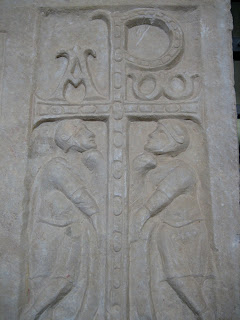Freed to love: why (rich) Christians need to think about climate change
For you were called to freedom, brothers and sisters; only do not use your freedom as an opportunity for self-indulgence, but through love become slaves to one another. For the whole law is summed up in a single commandment, ‘You shall love your neighbour as yourself.’Freedom is ordered towards love; we are free in order that we might love, and in love become slaves to one another. Christian liberty is the freedom to do good to my neighbour. Central amongst the goods I might do for my neighbour is echoing the divine call to enter into this very freedom to love. And so part of my free service will be inviting my brothers and sisters into the service of those around them: "Let us serve our neighbours and do good to everyone, especially to the household of faith!"
Yet this service is not exhausted by issuing such an invitation. There are many other ways of serving one another as well as proclaiming the good news of freedom in Christ. To be of service to my neighbours, some of the good things I can do will require more specific knowledge of my neighbours and their condition and context. Do they need food? Do they need to learn how to fish for themselves? Do they need to have their fish stocks protected from illegal fishing? Do they need medical aid? Do they need a healthcare system that delivers better care? Do they need a friend they can trust? Do they need a society in which trust is prized and protected? What fear or guilt is oppressing them? Is a fearful society confusing their ability to discriminate between threats? Are they a victim of crime? Is corruption undermining the rule of law in their community? Are they addicted to self-destructive behaviours? Does their society encourage them towards the idolatry of greed? Towards superficiality of judgement? Does their lifestyle (and that of their society) contribute to reducing the freedom of others to love and serve?
The answers to these questions will not be easy or simple. They will not be found only by studying the scriptures (though that will of course be part of it!). To love our neighbour, we have to pay close attention to the world and how it works, including the disputed areas.
At stake is the relation of knowledge to ethics. Saint Paul prayed that the Philippians’ love would "overflow more and more in knowledge and depth of insight" - knowledge of God and the good news of Jesus, yes, but also knowledge of one another and the world in which they are called to love. We cannot love our neighbours without some attempt at understanding them, their history and gifts, their situation and the world which we share, including its threats and possibilities.
For example, Christians amongst areas ravaged by AIDS will need to come to an opinion about whether HIV leads to AIDS or not (this is hotly contested in parts of Africa, and there are campaigns against the use of retro-viral drugs, and shoddy pseudo-scientists throwing mud into the air). Christian parents will need to come to an opinion about the benefits and costs of immunisation (where again, confusing signals have often been sent by the media based on poor scientific work). And Christians with influence in energy, in public policy, or those with carbon-intensive lifestyles and with global neighbours who live in drought or flood-prone areas will sooner or later have to have some kind of opinion on climatology and carbon.
Not every Christian is able or obliged to answer every conceivable question about how to love our neighbours, or to evaluate the variety of threats and opportunities we focus upon. But Christians do need to think carefully about which sources of knowledge are trustworthy, and what we do with that knowledge. Will we trust the IPCC and the national scientific bodies of thirty-two nations when they tell us they have over 90% confidence that human activities (particularly those in developed nations) are significantly contributing to changes with very serious negative effects now and increasingly into future decades (particularly on the world's poorest peoples)?
God doesn’t give us an exhaustive list of who we are to trust and how far. But that doesn’t mean the question is morally irrelevant or that refraining from the discussion is the best use of Christian freedom to love. This may not be the only or the greatest moral issue of our time, but it is a very significant one.
Christian freedom does not mean that we are released from the responsibility to consider carefully the effect that our habits, actions and beliefs have on those around us. Quite the opposite: we are liberated from the intolerable burden of having to save ourselves or our world, and given many opportunities to do all kinds of good. Let us use our freedom in order to love.






.JPG)







